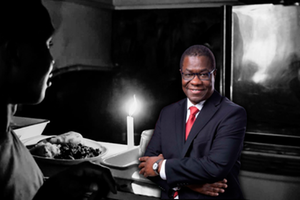Report: Kenya police abuse refugees

Mr Gerry Simpson, a researcher and advocate with Human Rights Watchdog, during the release of the HRW report that accused the Kenya police of abusing and extorting money from refugees at the Somalia border. Photo/WILLIAM OERI
The Kenya Police has been accused of abusing and extorting money from asylum seekers and refugees at the Somalia border and in nearby refugee camps.
A report released by the Human Rights Watch, Welcome to Kenya: Police Abuse of Somali Refugees, accuses the police of rape, extortion, brutality and illegal detention of Somali refugees and others crossing in for asylum.
Mr Gerry Simpson, a researcher and advocate with the rights watchdog, said the report was a result of interviews with 102 refugees in and around Daadab camps.
“Half of the interviewees spoke about police abuses, including excessive force leading to death and miscarriages, rape, whippings, beatings and kicking,” the report reads in part.
“Fifteen said the police had arrested and detained them – together with 220 other people – soon after they had entered Kenya.
“Eight said that the police had deported them, and 152 others, back to Somalia after they failed to pay the police money.”
Extort money
The report blames the abuses on the absence of a refugee screening centre at Liboi border, which it says encouraged police to extort money from asylum seekers on their way to the refugee camps.
“Once in the camps, some refugees face more police violence and the police turn a blind eye to sexual violence by other refugees and local Kenyans,” added Mr Simpson.
But in a swift rejoinder, deputy police spokesperson Charles Owino said the police force and Kenya should not be crucified based on a few criminal acts of individual police officers.
Mr Owino said the police welcomed the report and the Police Commissioner had already sent a team to the border to investigate the claims.
“So it will be very painful for this country to be portrayed as one that has sent refugees to the dogs,” said Mr Owino.
He said that Internal Security minister George Saitoti had constituted a team comprising local religious leaders, youth and women representatives and police to investigate the allegations.
The report recommends that the government opens a new screening centre at Liboi, investigate the alleged abuses and instruct the police to stop them, besides stationing more female police officers in the area to respond to sexual violence.
Monitoring system
It also asks the United Nations Commission for Refugees (UNHRC) to swiftly introduce a new protection monitoring system in the camps.
Mr Owino challenged the rights watch to “challenge us with very particular cases” of rape and educate the refugees not to clean up after rape and report immediately to the police so as to preserve delicate rape evidence.
He also said they will treat the report cautiously and verify the validity of its contents, adding that security officers have been intercepting bus loads of “the so-called asylum seekers” headed for Nairobi, who are rich and uninterested in being refugees.
The government closed the Liboi border three years ago citing security concerns following heightened fighting in Somalia which resulted in overwhelming influx of refugees.
Kenya is home to thousands of refugees from her unstable neighbours, including 325,000 from Somalia pushed out of their country by a civil war that started over two decades ago.




